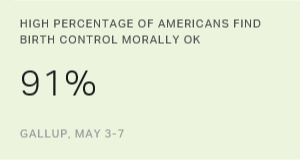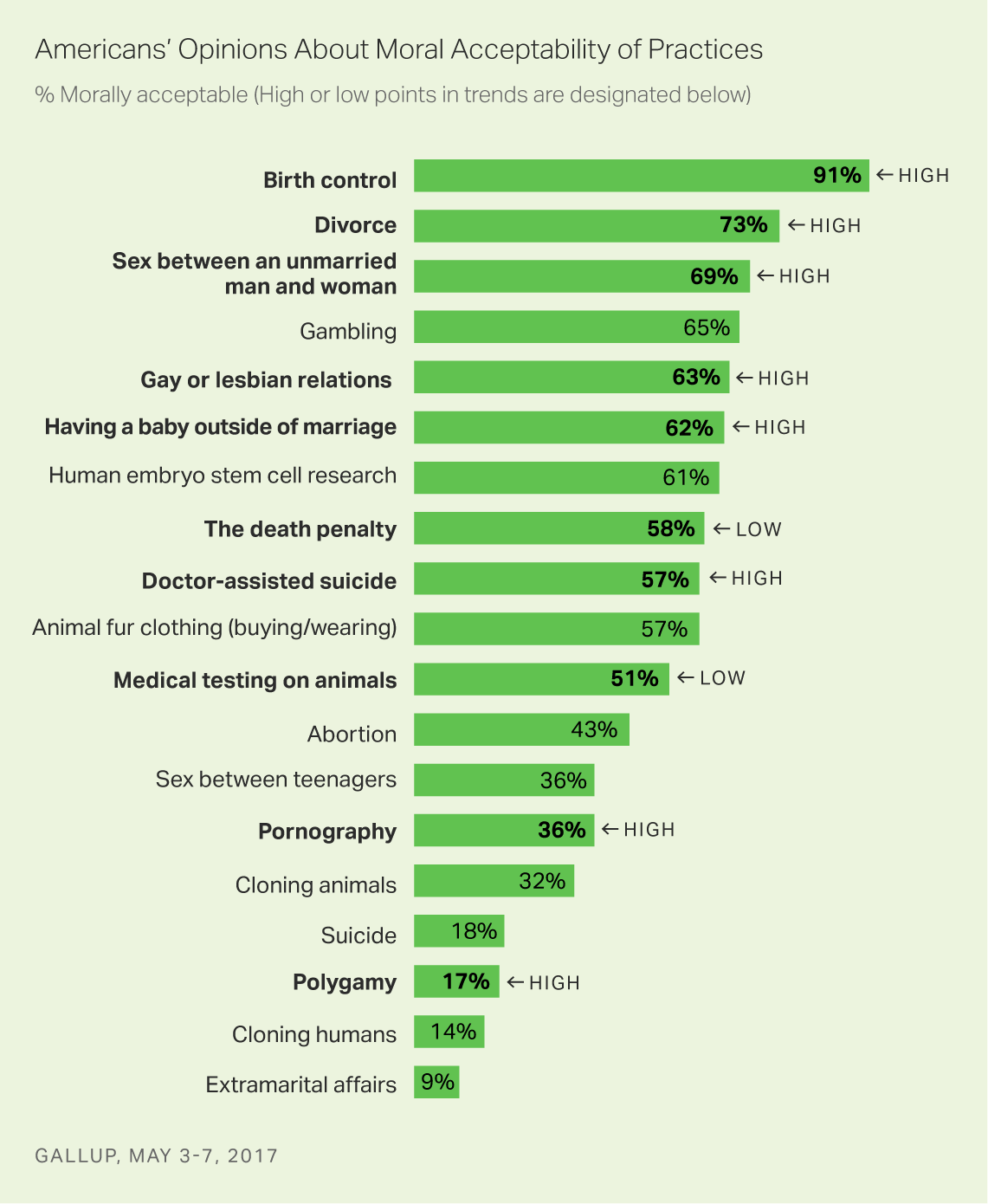
Americans Hold Record Liberal Views on Most Moral Issues

Story Highlights
- 10 of 19 issues show most permissive views to date
- Americans most in agreement on acceptability of birth control
- Extramarital affairs most likely to be seen as morally wrong
WASHINGTON, D.C. -- Americans continue to express an increasingly liberal outlook on what is morally acceptable, as their views on 10 of 19 moral issues that Gallup measures are the most left-leaning or permissive they have been to date. The percentages of U.S. adults who believe birth control, divorce, sex between unmarried people, gay or lesbian relations, having a baby outside of marriage, doctor-assisted suicide, pornography and polygamy are morally acceptable practices have tied record highs or set new ones this year. At the same time, record lows say the death penalty and medical testing on animals are morally acceptable.

These results are based on Gallup's annual Values and Beliefs poll, conducted May 3-7. Each year, Americans are asked to rate whether different practices are morally acceptable or morally wrong. Gallup first asked the question in 2001 about 13 issues, with additional items added in subsequent years.
The leftward movement in perceptions of what is morally acceptable has been ongoing, with Gallup also noting shifts in 2014 and 2015. Since then, there have been additional, albeit slight, changes in a more permissive direction. All of the new highs this year are one or two percentage points above previous highs.
On an absolute basis, Americans are most likely to view birth control, divorce and sex between unmarried people as morally acceptable. At least two-thirds say each of these is OK.
Americans are least likely to believe suicide, polygamy, cloning humans and extramarital affairs are permissible; fewer than one in five say these practices are morally acceptable.
The public is most divided on abortion and medical testing on animals. Currently, 43% of Americans say abortion is morally acceptable, and 49% say it is morally wrong. Meanwhile, 51% say medical testing on animals is OK, while 44% disagree.
Over Time, No Issues Show Movement Toward Conservative Positions
Of the 19 issues included in this year's poll, 13 show meaningful change in a liberal direction over time, regardless of whether they are currently at their high point in Gallup's trend. No issues show meaningful change toward more traditionally conservative positions compared with when Gallup first measured them. That leaves six issues for which there has essentially been no change over time.
| First year asked | 2017 | Change | ||||||||||||||||||||||||||||||||||||||||||||||||||||||||||||||||||||||||||||||||||||||||||||||||||
|---|---|---|---|---|---|---|---|---|---|---|---|---|---|---|---|---|---|---|---|---|---|---|---|---|---|---|---|---|---|---|---|---|---|---|---|---|---|---|---|---|---|---|---|---|---|---|---|---|---|---|---|---|---|---|---|---|---|---|---|---|---|---|---|---|---|---|---|---|---|---|---|---|---|---|---|---|---|---|---|---|---|---|---|---|---|---|---|---|---|---|---|---|---|---|---|---|---|---|---|---|
| % | % | pct. pts. | ||||||||||||||||||||||||||||||||||||||||||||||||||||||||||||||||||||||||||||||||||||||||||||||||||
| More liberal views | ||||||||||||||||||||||||||||||||||||||||||||||||||||||||||||||||||||||||||||||||||||||||||||||||||||
| Gay/Lesbian relations | 40 | 63 | +23 | |||||||||||||||||||||||||||||||||||||||||||||||||||||||||||||||||||||||||||||||||||||||||||||||||
| Having a baby outside of marriage (2002) | 45 | 62 | +17 | |||||||||||||||||||||||||||||||||||||||||||||||||||||||||||||||||||||||||||||||||||||||||||||||||
| Sex between an unmarried man and woman | 53 | 69 | +16 | |||||||||||||||||||||||||||||||||||||||||||||||||||||||||||||||||||||||||||||||||||||||||||||||||
| Divorce | 59 | 73 | +14 | |||||||||||||||||||||||||||||||||||||||||||||||||||||||||||||||||||||||||||||||||||||||||||||||||
| Medical testing on animals | 65 | 51 | -14 | |||||||||||||||||||||||||||||||||||||||||||||||||||||||||||||||||||||||||||||||||||||||||||||||||
| Polygamy (2003) | 7 | 17 | +10 | |||||||||||||||||||||||||||||||||||||||||||||||||||||||||||||||||||||||||||||||||||||||||||||||||
| Human embryo stem cell research (2002) | 52 | 61 | +9 | |||||||||||||||||||||||||||||||||||||||||||||||||||||||||||||||||||||||||||||||||||||||||||||||||
| Doctor-assisted suicide | 49 | 57 | +8 | |||||||||||||||||||||||||||||||||||||||||||||||||||||||||||||||||||||||||||||||||||||||||||||||||
| Cloning humans | 7 | 14 | +7 | |||||||||||||||||||||||||||||||||||||||||||||||||||||||||||||||||||||||||||||||||||||||||||||||||
| Pornography (2011) | 30 | 36 | +6 | |||||||||||||||||||||||||||||||||||||||||||||||||||||||||||||||||||||||||||||||||||||||||||||||||
| Suicide | 13 | 18 | +5 | |||||||||||||||||||||||||||||||||||||||||||||||||||||||||||||||||||||||||||||||||||||||||||||||||
| Death penalty | 63 | 58 | -5 | |||||||||||||||||||||||||||||||||||||||||||||||||||||||||||||||||||||||||||||||||||||||||||||||||
| Sex between teenagers (2013) | 32 | 36 | +4 | |||||||||||||||||||||||||||||||||||||||||||||||||||||||||||||||||||||||||||||||||||||||||||||||||
| No change | ||||||||||||||||||||||||||||||||||||||||||||||||||||||||||||||||||||||||||||||||||||||||||||||||||||
| Extramarital affairs | 7 | 9 | +2 | |||||||||||||||||||||||||||||||||||||||||||||||||||||||||||||||||||||||||||||||||||||||||||||||||
| Gambling (2003) | 63 | 65 | +2 | |||||||||||||||||||||||||||||||||||||||||||||||||||||||||||||||||||||||||||||||||||||||||||||||||
| Birth control (2012) | 89 | 91 | +2 | |||||||||||||||||||||||||||||||||||||||||||||||||||||||||||||||||||||||||||||||||||||||||||||||||
| Abortion | 42 | 43 | +1 | |||||||||||||||||||||||||||||||||||||||||||||||||||||||||||||||||||||||||||||||||||||||||||||||||
| Cloning animals | 31 | 32 | +1 | |||||||||||||||||||||||||||||||||||||||||||||||||||||||||||||||||||||||||||||||||||||||||||||||||
| Animal fur clothing (buying/wearing) | 60 | 57 | -3 | |||||||||||||||||||||||||||||||||||||||||||||||||||||||||||||||||||||||||||||||||||||||||||||||||
| Items were first asked in 2001 unless indicated. | ||||||||||||||||||||||||||||||||||||||||||||||||||||||||||||||||||||||||||||||||||||||||||||||||||||
| Gallup | ||||||||||||||||||||||||||||||||||||||||||||||||||||||||||||||||||||||||||||||||||||||||||||||||||||
One of the six issues showing virtually no change is birth control. Opinions on this issue have been highly permissive since Gallup first asked about it in 2012, ranging between 89% and 91% finding it acceptable. The other five issues showing no change since Gallup first measured them are abortion, buying and wearing clothing made of animal fur, extramarital affairs, cloning animals, and gambling.
Some of the largest changes in opinion reflect a transformation in Americans' views about the institution of marriage and intimate relationships. Since the early 2000s, the percentage saying that gay or lesbian relations, having a baby outside of marriage, sex between an unmarried man and woman, and divorce are morally acceptable have increased by double digits.
Gallup has previously shown that Americans in all age groups have adopted more liberal views on these issues over time, but the changes have been proportionately greater among older Americans. Older Americans today are more accepting of same-sex relations and sex between unmarried people than older Americans at the turn of the century were. Still, older Americans today are not as likely as younger Americans to hold permissive views on these issues.
Medical testing on animals is another issue showing substantial change over the past 16 years, with the percentage finding it morally acceptable dropping from 65% in 2001 -- when it ranked among the most acceptable issues -- to 51% today. Unlike the shifts in attitudes about marriage, young adults are driving attitudinal changes on animal medical testing. Fifty-nine percent of Americans aged 50 and older believe medical testing on animals is morally acceptable, compared with 45% of those younger than 50.
Implications
Americans have adopted more permissive views on matters of morality than they held at the beginning of the 21st century. Much of this change was apparent a few years ago, but opinions continue to shift in a slightly more left-leaning direction. Some of this change reflects increased social tolerance, while some is attributable to generational changes. It would appear that U.S. opinions will continue on this path, as younger, more liberal generations replace older, more conservative ones in the U.S. population.
Not only is the more liberal outlook apparent in the perceived morality of issues, but it is also evident in the increasing percentage of Americans who describe themselves as liberal on social issues. Currently, about as many Americans say they are socially liberal as say they are socially conservative; in the past, conservatives outnumbered liberals by a significant margin.
And while more Americans still identify themselves as politically conservative than as politically liberal, that gap is shrinking as well.
Historical data are available in Gallup Analytics.
Survey Methods
Results for this Gallup poll are based on telephone interviews conducted May 3-7, 2017, with a random sample of 1,011 adults, aged 18 and older, living in all 50 U.S. states and the District of Columbia. For results based on the total sample of national adults, the margin of sampling error is ±4 percentage points at the 95% confidence level. All reported margins of sampling error include computed design effects for weighting.
Each sample of national adults includes a minimum quota of 70% cellphone respondents and 30% landline respondents, with additional minimum quotas by time zone within region. Landline and cellular telephone numbers are selected using random-digit-dial methods.
View survey methodology, complete question responses and trends.
Learn more about how the Gallup Poll Social Series works.
